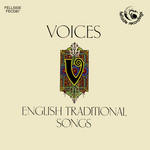> Folk Music > Records > Voices: English Traditional Songs
Voices: English Traditional Songs
 |
Voices Fellside Recordings FECD87 (CD, UK, 1992) |
 |
Compilation produced by Paul Adams.
All tracks recorded by Paul Adams unless otherwise stated.
Edited by Graham Bell.
Tracks
- Maddy Prior: The Blacksmith (Roud 816) (3.14)
- Cyril Tawney: The Broken Token (Roud 264; Laws N42; G/D 5:1038, 6:1201; Henry H471) (2.19)
- The Watersons: Cob-a-Coaling (Roud 9234) (2.01)
- Peta Webb: Go and Leave Me (Roud 459; G/D 6:1145) (4.39)
- A. L. Lloyd: The Mower
(Roud 833)
(2.00)
from The Bird in the Bush (Topic 12T135, 1966) - Roy Bailey: Four Loom Weaver (Roud 937) (2.51)
- Dave Weatherall & Martin Hall: Two Brethren (Roud 202) (2.24)
- Linda Adams: Up in the North (Roud 582; Laws P3; G/D 4:895) (2.58)
- Martyn Wyndham-Read: The Constant Lovers (Roud 466; Laws K17; G/D 6:1244) (5.26)
- Peter Bellamy: The Brisk Young Widow
(Roud 2438)
(1.43)
from Songs an’ Rummy Conjurin’ Tricks (Fellside FSC5, 1991) - Hughie Jones: Sweet William’s Ghost (Roud 50; Child 77) (3.48)
- Patti Reid: The Fowler (Polly Vaughan) (Roud 166; Laws O36; Henry H114) (3.19)
- The Wilsons: 18th Day of June (Plains of Waterloo) (Roud 1132; Henry H608) (3.03)
- Bram Taylor: Lord Randal (Roud 10; Child 12; G/D 2:209; Henry H814) (4.00)
- Damien Barber: Old Brown’s Daughter (Roud 1426) (2.58)
- Frankie Armstrong: Banks of Green Willow (Roud 172; Child 24; G/D 6:1225) (4.12)
- John Kirkpatrick: King Jamie and the Tinker (Roud 8946) (4.53)
- Martin Carthy: Young Emma (Roud 182; Laws M34; G/D 2:189; Henry H113) (4.53)
- The Arthur Family: Come Write Me Down (Wedding Song) (Roud 381; G/D 5:980) (2.54)
- Roy Harris: I Would That the Wars Were All Done
(Roud 2036)
(1.59)
from The Rambling Soldier (Fellside FE017, 1979) - Shirley Collins: The Banks of the Mossom
(Roud 1646)
(1.49)
from Adieu to Old England (Topic 12TS238, 1974) - Dave Burland: William Taylor (Roud 158; Laws N11; G/D 1:169; Henry H213, H757) (2.41)
- Swan Arcade: Noah’s Ark Shanty (Roud 318) (2.23)
- June Tabor: The Bonny Boy
(Roud 293; G/D 6:1141; Henry H215)
(2.59)
from Abyssinians (Topic 12TS432, 1983) - Jez Lowe & The Bad Pennies: Felton Lonnen (Roud 3166) / Here’s the Tender Coming (Roud 3174) (3.18)
Sleeve Notes
Singing is one of the basic human art forms; apart from humming, whistling or tapping some part of the body, it is the only way of making music. We share the art with various other creatures on this planet and, as far as we can tell, humans have always sung in one form or another and in every culture. The collection of songs on this recording belongs to a group called English Traditional folk songs and they are presented in their simplest form—unaccompanied by musical instruments. To describe some of the singing here as simple is to do the singers a grave injustice because you will find here some of the supreme stylists performing within the genre; from the gentle nuances of Dave Burland’s style, through the intricate decorations of Maddy Prior and Martyn Wyndham-Read, all way to the outrageous mannerisms of Pete Bellamy. The harmony singing takes in the highly structured part singing of Swan Arcade as well as the loose harmonies of The Watersons.
All the singers here are what are termed Revival singers having come into this style of singing through the folk song revival. Many were probably influenced by singing traditions within their own families, but they have also turned to books, recordings and other revival singers as well as the whole gamut of 20th Century musical culture, to develop their style. They will also have used as their focal point what are termed “source” singers: people who have grown up in a culture where singing songs (traditional or otherwise) was part of the life which went on around them. Various source singers are mentioned in the notes to the songs and the listener is encouraged to seek out what recordings are available. There are almost four generations of revival singers represented here: starting with the late A.L. Lloyd, on to Cyril Tawney, Hughie Jones and Martin Carthy to Jez Lowe and The Wilson Family right up to young singers such as Damien Barber and Eliza Carthy who have joined the continuum. It is hard to find a stereotype folk singer here. A wide variety of styled and techniques are used. All have absorbed from, and paid their dues to, the tradition.
This album does not set out to represent all types of traditional songs. The singers were asked to contribute a song of their choice. In fact you will find examples of sea songs, broken token ballads, rustic idylls, industrial ballads, ritual songs and classic ballads. The sources include songs from the early collections of Cecil Sharp, from the continuing traditions of families such as the Coppers from Sussex and from other singers who are still alive. Are traditional songs relevant today? This subject could occupy many pages, but suffice it to say that you will find in these songs madness, abduction, sex, transvestites, songs about work, tall tales, love, war and all the other things we read about in our daily papers which have interested folk for centuries.
This collection came about because I felt that English traditional song had been neglected by the so-called World / Roots music movement of the late 1980’s. Here I must pay tribute to the late Peter Bellamy, friend, journeyman singer, influencer of folk scenes and champion of traditional song. After the idea had been rattling around my head for some time, I talked it over with Pete late one night. He became fired with enthusiasm and bullied me into getting on with it. His sudden death was a tragic loss. This album is dedicated to Pete and I would like to think that he would be pleased with the result. It is also a tribute to all those who keep the tradition alive. My grateful thanks go to all the singers who gave of their time and talents and who entered into the spirit of the project.
© Paul Adams, 1992 (Compiled from notes supplied by the singers)

